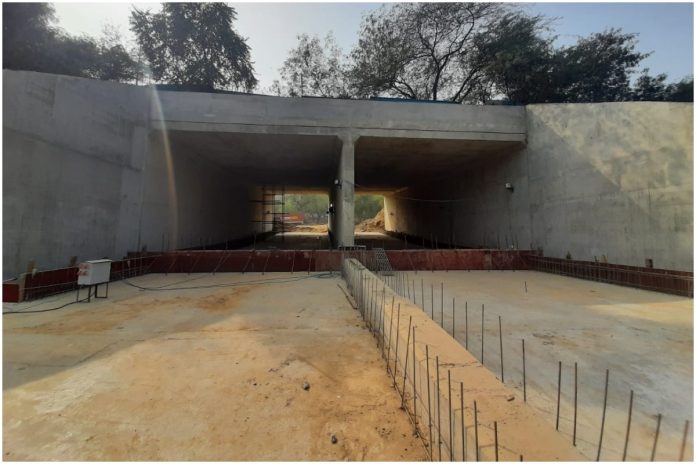Snapshot
The underpass is of four lanes and passes under Mathura Road, enabling movement of every type of vehicle including heavy motor vehicles to the Jangpura RRTS station as well as maintenance yard being constructed at the location for all three corridors of the RRTS network.
With the use of box-pushing technology, the National Capital Region Transport Corporation (NCRTC) has completed construction of Jangpura RRTS station underpass to enable smooth traffic movement in the area.
Jangpura RRTS station is the 25th station on the 82 km long Delhi–Ghaziabad–Meerut RRTS corridor being constructed here with a stabling yard for train maintenance, operational control centre, office complexes and residential towers.
The underpass is of four lanes and passes under Mathura Road, enabling movement of every type of vehicle including heavy motor vehicles to the Jangpura RRTS station as well as maintenance yard being constructed at the location for all three corridors of the RRTS network.
According to a senior NCRTC official, Jangpura RRTS station is being connected by Mathura Road in South Delhi for smooth accessibility of the station.
In the process, a four-lane connecting road is being constructed by NCRTC from Mathura Road to go towards Jangpura RRTS station.
With the underpass construction in place, the residents of Ashram, Maharani Bagh, Nizamuddin and Jangpura can avail RRTS services easily, without any hassle of getting stuck in traffic jams.
The underpass construction has been done by box-pushing technology using precast boxes and pushing was done with the help of hydraulic jacks, without disturbing movement of traffic.
This underpass is completely pedestrian friendly as about a 1.5-metre-wide space on both sides is dedicated to pedestrian movement. Each underpass box is about 8.5 metres wide.
These boxes will be joined with a Reinforced Earth (RE) wall to create the ramps and loop to complete the connectivity.
The construction of the RE wall is expected to be completed in the first quarter of this year. At present, this site has poor connectivity as it is landlocked by three railway lines.
The existing connectivity through Rail Over Bridge (ROB) is sufficient only for Light Motor Vehicles (LMVs) due to less height clearance, while the other option is from an at-grade railway crossing, which is not seamless due to frequent train movement on the route.
Once completed, connectivity to Jangpura RRTS station complex as well as the train stabling yard from Mathura Road will be seamless, enabling movement of LMVs, Heavy Motor Vehicles (HMVs), as well as fire tenders, thereby providing access to critical RRTS infrastructure as well as adding value to the infrastructure landscape of Delhi.
NCRTC is implementing India’s first Regional Rapid Transit System (RRTS) which is a rail-based, high-speed, high-frequency regional commuter transit system.
It has a design speed of 180 kmph and an average speed of 100 kmph. Powered by electric traction, RRTS will serve as a green mode of transport in NCR.
It will also lead to reduction in vehicular congestion and air pollution in the National Capital Region.
Currently, the 20th launching gantry has been installed on the 82-km RRTS corridor for the construction of an elevated portion. More than 1,200 piers have already been constructed with 56 km of foundation work and 16 km of viaduct.
The 17-km priority section between Sahibabad to Duhai is targeted to be commissioned by 2023 and the full corridor from Sarai Kale Khan to Meerut by 2025.
NCRTC has managed the pace of the construction while simultaneously taking extensive pollution control measures in and around the construction sites.
A dedicated team of experts is regularly monitoring the effectiveness of these measures and steps up activities wherever necessary.
Construction work is being done within barricaded zones of adequate height and thorough cleanliness is being maintained on these sites. Anti-smog guns, and water sprinklers are deployed to settle construction dust. All the raw materials, and debris are kept covered at their marked sites.


